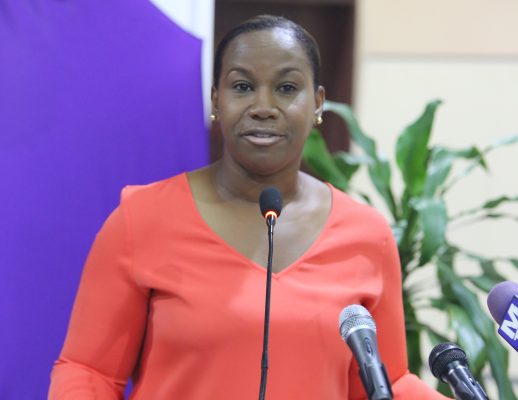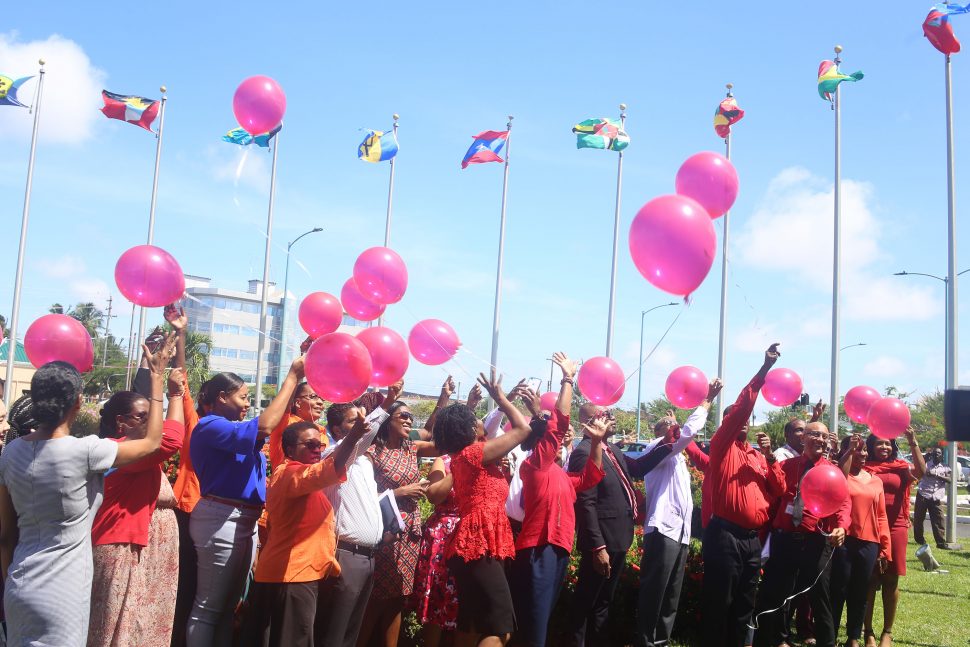Sixteen days of global activism for the empowerment of women will begin tomorrow, with key priorities being the elimination of gender-based violence and fighting HIV/AIDs.
Encompassed within the 16 days of the UN Women programme are the Inter-national Day for the Elimination of Violence against Women, World AIDS Day, International Women Human Rights Defenders Day and Human Rights Day.
This year’s observances have seen a first-time collaboration between the coordinating unit of the Pan Caribbean Partnership Against HIV/AIDS (PANCAP) and the Gender and Development Unit within the CARICOM Secretariat’s Directorate for Human and Social Development.

Speaking at yesterday’s launch of the observances, Director of PANCAP Dereck Springer emphasised the importance of this year’s World AIDS Day theme, ‘Know Your Status,’ as he explained that of the 310,000 persons in the Caribbean who were estimated to be HIV positive at the end of 2017, the global AIDS monitoring report indicates that 54,800 were unaware of it.
“This really provides us with the critical evidence that we need to get more people tested,” he said, before adding that knowing one’s status allows those who test negative an opportunity to identify and avoid that which may make them vulnerable and serves as an entry point for care, treatment and support for those who test positive for the Human Immuno-deficiency Virus (HIV).
“It is, therefore, very critical that we ensure that if we are to achieve the end of AIDS, people must first know their HIV status and, therefore, when we encourage them to come forward, policymakers and programme managers must be held accountable to ensure that the promised treatment for those who test positive, that they will receive it,” the Director posited.
Critical to the fight against HIV and AIDS, however, is recognising the socio-economic issues that put people at risk and make them vulnerable to contracting the virus.
High among the list of socio-economic factors is gender-based violence and, therefore, the recognition that gender is a very critical component to the response to HIV is guiding collaboration, he said.
“There is that correlation between the two; women and girls are much more vulnerable because of biology but they are also more vulnerable because of the power dynamics that exist within relationships. We have many women who are afraid to be tested because of concerns that if they test HIV positive, that they can suffer both emotional and physical violence, sometimes even death at the hands of their partners,” Springer stated.
“Transgender women are also vulnerable to HIV, particularly because of the stigma and discrimination that they suffer; men and boys are also vulnerable and, therefore, it is crucial that we really bring this issue around gender within the context of HIV out of isolation and really begin to focus on the challenges that confront us in relation to gender and HIV,” he added.
Similar sentiments were shared by Ann-Marie Williams, Deputy Programme Manager (Gender and Development) at the CARICOM Secretariat, who noted that women and girls are disproportionately affected by violence
Alluding to the theme for this year’s International Day for the Elimination of Violence Against Women (November 25th), “Orange the World: #HearMeToo,” Williams said, “the 16 days of activism is a time to galvanise action to end violence around the world; to end impunity, silence and stigma that have allowed violence against women and girls to escalate to pandemic proportions and in some cases it has become so normalised that we don’t even see it. And when we don’t see, that makes it even more acceptable.”
She noted that the Carib-bean region accounts for some of the highest rates of violence in the world and despite the adoption of the Convention on the Elimination of all forms of Discrimination Against Women by the UN General Assembly in 1979, violence against women and girls remains a pervasive problem everywhere.
Dr. Douglas Slater, CARICOM Assistant Secretary General, Human and Social Development, announced that the gender development programme is working on a draft CARICOM regional gender equality strategy, which addresses gender-based violence as one of the six priorities.
The document, he said, is in the consultancy stage.
Notwithstanding, he urged that citizens be proactive in their approach to ending gender-based violence during the 16 days of activism.
“Let us be proactive in our approach to ending gender-based violence by implementing commonsense approaches and programmes starting in our homes, schools, places of worship and work and in our communities that prevent such violence from occurring in the first place. In doing so, we would scale up our efforts to achieve gender equality and empowerment of women and girls and by extension the sustainable development goals of affording the over 12 million women in our Caribbean region an opportunity to enjoy the full complement of their human rights and create a safer and more productive world for all its citizens,” Dr. Slater said.










